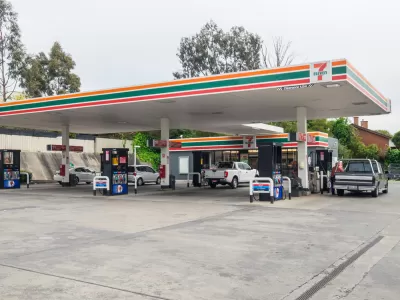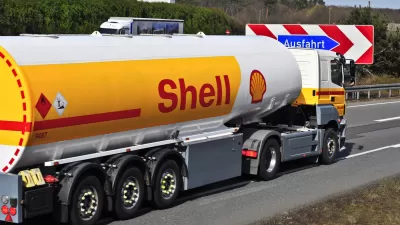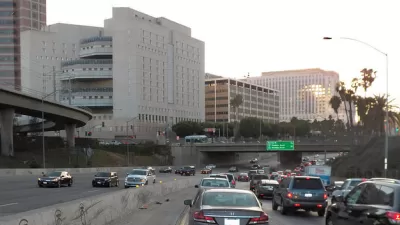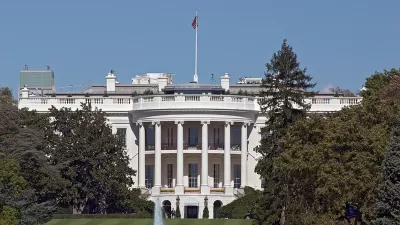Conventional thinking is that the auto industry, wanting to sell more fuel-gulping SUVs, are pushing for weaker fuel economy standards, but Hiroko Tabuchi, climate reporter for The New York Times, exposes Big Oil's stealth campaign.

"In Congress, on Facebook and in statehouses nationwide, Marathon Petroleum, the country’s largest refiner, worked with powerful oil-industry groups and a conservative policy network financed by the billionaire industrialist Charles G. Koch to run a stealth campaign to roll back car emissions standards, a New York Times investigation has found," reports Hiroko Tabuchi.
The logic is simple: Lower standards means more gasoline sales. "The campaign’s main argument for significantly easing fuel efficiency standards is that the United States is so awash in oil it no longer needs to worry about energy conservation."
The campaign proved effective, as parts are reflected in the rule proposed by the Trump administration in August, the Safer Affordable Fuel Efficient (SAFE) Vehicles Proposed Rule for Model Years 2021-2026.
In recent months, Marathon Petroleum also teamed up with the American Legislative Exchange Council (ALEC), a secretive policy group financed by corporations as well as the Koch network, to draft legislation for states supporting the industry’s position.
Its "Resolution In Support Of The Reconsideration Of Corporate Average Fuel Economy (CAFE) Standards," points to the historical underpinning of the U.S Department of Transportation's fuel economy standards, "implemented largely in response to the 1973 oil embargo in an effort to reduce foreign imports of petroleum," takes aim at changes made under the Obama administration.
In 2010, the U.S. Environmental Protection Agency and the California Air Resources Board joined the National Highway Traffic Safety Administration (NHTSA, a division of USDOT) to regulate tailpipe emissions as well as fuel economy, a result of the 2007 U.S. Supreme Court's decision in Massachusetts v. EPA that affirmed that the Clean Air Act gives authority to EPA and California to regulate greenhouse gas emissions. The three agencies agree to a "One National Program," also called “Single National Standard.”
The energy industry’s efforts also help explain the Trump administration’s confrontational stance toward California, which, under federal law, has a unique authority to write its own clean-air rules and to mandate more zero-emissions vehicles.
Legislation was proposed last year by Rep. Roger Williams (R-Tex.) to abandon fuel economy standards altogether.
Why Marathon Petroleum?
[F]or gasoline producers like Marathon, a shift toward more efficient vehicles poses a grave threat to the bottom line. In October, the company acquired a rival, Andeavor [formerly Tesoro], making it the biggest refiner in the United States, with sales of 16 billion gallons of fuel a year.
Andeavor also surfaced in a recent Planetizen post showing the influence of Big Oil, but in an overt, not stealthy, manner. Andeavor, BP America, and Phillips 66 were identified as the largest contributors to the successful campaign to defeat a Washington carbon fee initiative, setting a Washington state fundraising record.
FULL STORY: The Oil Industry’s Covert Campaign to Rewrite American Car Emissions Rules

Alabama: Trump Terminates Settlements for Black Communities Harmed By Raw Sewage
Trump deemed the landmark civil rights agreement “illegal DEI and environmental justice policy.”

Study: Maui’s Plan to Convert Vacation Rentals to Long-Term Housing Could Cause Nearly $1 Billion Economic Loss
The plan would reduce visitor accommodation by 25% resulting in 1,900 jobs lost.

Why Should We Subsidize Public Transportation?
Many public transit agencies face financial stress due to rising costs, declining fare revenue, and declining subsidies. Transit advocates must provide a strong business case for increasing public transit funding.

Paris Bike Boom Leads to Steep Drop in Air Pollution
The French city’s air quality has improved dramatically in the past 20 years, coinciding with a growth in cycling.

Why Housing Costs More to Build in California Than in Texas
Hard costs like labor and materials combined with ‘soft’ costs such as permitting make building in the San Francisco Bay Area almost three times as costly as in Texas cities.

San Diego County Sees a Rise in Urban Coyotes
San Diego County experiences a rise in urban coyotes, as sightings become prevalent throughout its urban neighbourhoods and surrounding areas.
Urban Design for Planners 1: Software Tools
This six-course series explores essential urban design concepts using open source software and equips planners with the tools they need to participate fully in the urban design process.
Planning for Universal Design
Learn the tools for implementing Universal Design in planning regulations.
Smith Gee Studio
Alamo Area Metropolitan Planning Organization
City of Santa Clarita
Institute for Housing and Urban Development Studies (IHS)
City of Grandview
Harvard GSD Executive Education
Toledo-Lucas County Plan Commissions
Salt Lake City
NYU Wagner Graduate School of Public Service





























